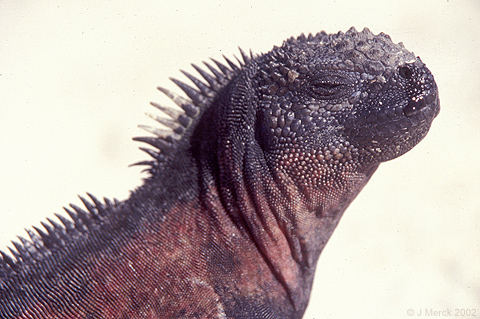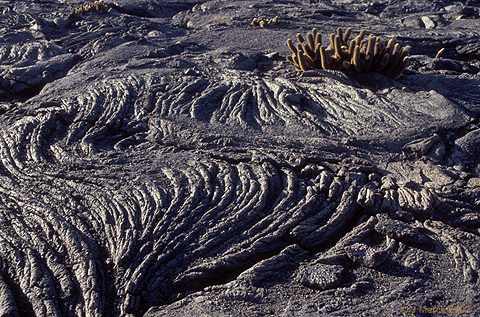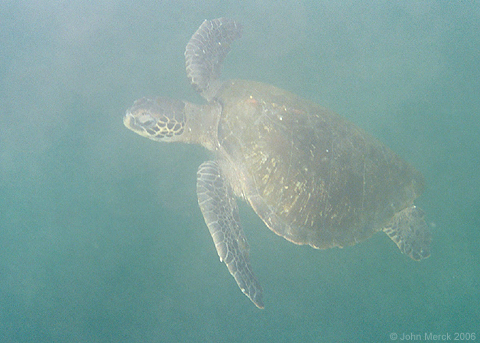THE GALÁPAGOS ISLANDS
|
The Galápagos Islands are one of Earth's greatest natural laboratories. With their arid climate and bizarre biota, these volcanic islands
strike us as forbidding and inhospitable.But the accessibility of this volcanic landscape and its inhabitants makes it a setting for a truly
life-changing natural science field program.
The approachability of their fearlessly naive wildlife facilitates unique opportunities to observe unusual land and sea birds, giant tortoises, marine and land iguanas, and other unique creatures up close. Equally significant are the islands themselves. Nowhere else are the characteristics of active oceanic hot-spot volcanism expressed in as accessible a locality. Indeed, the islands' aridity and sparseness of vegetation gives them the same kind of appeal to geologists as the American Southwest, however nowhere on any continent can you see the effects of deep-seated volcanic activity that are on display in the Galápagos. Link to web site for our most recent Galápagos travel study.
|

|

|
ITINERARY Students spend eight days in the islands aboard the Angelito. A typical day involves two stops for hiking or snorkeling. Destinations include:
Transit to and from the islands includes overnight stays in Quito, Ecuador. Before our return, we will tour this site of the world's finest surviving Spanish colonial architecture.
|
|
FACULTY DIRECTOR Dr. Thomas Holtz is director of the College Park Scholars-Science and Global Change program and a senior lecturer in Geology. Holtz is a well-known vertebrate paleobiologist and the author of numerous scholarly and popular publications. He will be joined by fellow paleontologist Dr. John Merck, associate director of the Science and Global Change program, and Undergraduate Director for the Department of Geology, and by an expert official naturalist guide from the Ecuadorian National Park Service. GRADING AND CREDIT Students will enroll in GEOL 388: Field Studies II (3 credits). Students meet for 2 intensive days of lecture on campus (May 25-26) covering major aspects of Galápagos Zoology, Botany, Geology, Ecology, Evolutionary Biology, and human issues, and to handle organizational details of the trip. An exam constituting 50% of the overall grade will be administered on May 27, prior to departure. Upon return, students will submit a paper discussing their personal observations of the scientific and conservation issues covered in lecture.
|

|

|
PROGRAM COST The program fee of $4,600 includes tuition, lodging in Quito, air fare from Quito to and from the Galápagos, passage and meals aboard the Angelito, Galápagos National Park entrance, and Quito city tour. Students are responsible for personal expenses, meals on shore, and their own international airfare. Additionally, students are responsible for their own room and board during the three days on campus prior to the travel portion of the course. The study abroad office will suggest a group flight itinerary that each student is responsible for purchasing directly from a travel agent. Although flight costs are not guaranteed and will vary, we estimate round-trip airfare for this program from the Washington, DC area to Quito will be approximately $1600. Once admitted, you should expect to purchase the flight for the program a few weeks later, before Spring Break. SCHOLARSHIPS The Study Abroad Office offers scholarships for undergraduate UM students to attend Summer Term programs. They are awarded based on academic achievement and financial need. The last day to apply for scholarships is Friday, March 1, 2011.
|
|
ELIGIBILITY This program is designed for students who are highly motivated, both academically and personally, and who are seeking a life-changing experience in a unique learning environment. Students must have a strong interest in Botany, Zoology, Geology, the natural history of island faunas, the dynamics of evolution, the history of science, and/or wildlife conservation. Knowledge of Spanish is not required. Applicants should have a 2.5 GPA or higher. Preference will be given to former or current students in CPS Earth, Life, and Time or Science and Global Change programs or in the Department of Geology, although the program is open to all University of Maryland, College Park undergraduates.
|

|

|
TO APPLY
For program and course information, please contact Dr. Thomas Holtz at tholtz@umd.edu. |



